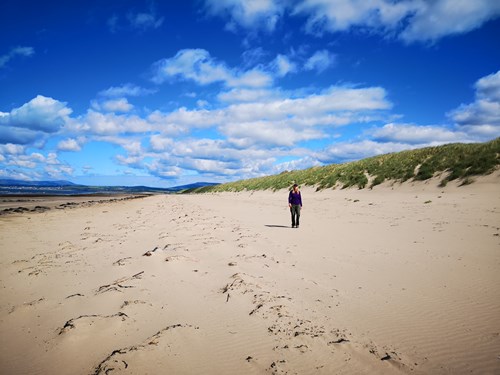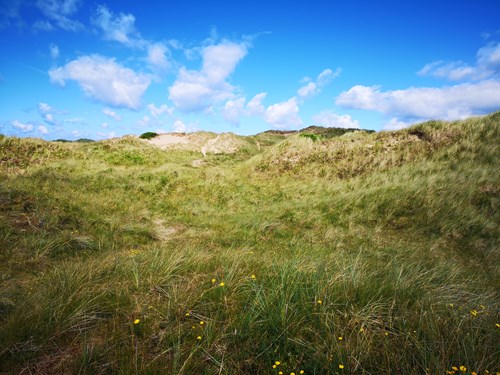Beddgelert Forest, near Beddgelert
Huge forest in the heart of Eryri (Snowdonia)...

Morfa Harlech National Nature Reserve is one of the most important actively growing dune systems in Britain and one of only a handful in Wales.
Dunes like these with bare sand areas are becoming increasingly rare.
This impressive coastal landscape is one of our richest natural treasures and home to a diverse range of plants and animals, all especially adapted to life at the edge of the sea.
Together with Morfa Dyffryn National Nature Reserve in the south, the two reserves form an almost continuous area of sand dunes along the coastline.

There is a public footpath from Min y Don car park to the beach (turn right along the beach to reach the start of the reserve).
We have fenced off some parts of the reserve to allow grazing or to protect fragile dune plants.
Please keep dogs on leads during the bird breeding season March – July; ringed plovers nest right on the beach and other birds nest in the dunes and saltmarsh.
Morfa Harlech is a National Nature Reserve.
National Nature Reserves are places with some of the very finest examples of wildlife habitats and geological features.
The landscape and wildlife varies depending on which time of year you visit – here’s what to look out for.

In spring and summer keep an eye out for the three-coloured dune pansy, the pyramidal orchid or even the scarce bee orchid.
You may also be lucky enough to see a maiden pink.
In autumn, there are displays of late flowering plants such as autumn gentians and autumn ladies tresses within the dunes. Look out for unique fungi growing in the dunes, too!
When in flower, the dry dune grasslands are home to a number of butterflies and moths, such as the six-spot burnet moth and the common blue and small copper butterflies.
Other insects such as some of our rarest mining bees and solitary wasps depend on bare sand and you may spot a sand lizard, too.
Ringed plover nest on the beach from March – July so please try not to disturb them!
Birds such as the skylark and stonechat breed in the dunes, with redshank and lapwing using the saltmarsh.
In winter wading birds such as oystercatcher, dunlin and sanderling feed along the shoreline, and wildfowl make use of the estuaries and saltmarsh.
There are over 70 National Nature Reserves in Wales.
Find out more about National Nature Reserves.
The Wales Coast Path goes through Morfa Harlech National Nature Reserve.
The Wales Coast Path provides a continuous walking route around the coastline of Wales.
To find out more go to the Wales Coast Path website .
Morfa Harlech is in Eryri (Snowdonia) National Park.
Eryri is the largest National Park in Wales and is home to picturesque towns and villages and the highest mountain in Wales.
It is looked after by the Eryri National Park Authority.
For more information about visiting Eryri go to the Eryri National Park Authority website.
We want you to return home safely after your visit here.
You are responsible for your own safety as well as the safety of any children and animals with you during your visit.
Please note:
For advice and tips to help you plan your visit here go to Visiting our places safely.
See the top of this webpage for details of any planned closures or other changes to visitor facilities here.
For your safety, always follow instructions from staff and signs including those for trail diversions or closures.
We may divert or close trails whilst we undertake maintenance work or other operations and we may need to close other visitor facilities temporarily.
In extreme weather, we may close facilities at short notice due to the risk of injury to visitors and staff.
You may need permission from us to organise an event or to carry out some activities on our land.
Check if you are allowed to use our land.
Morfa Harlech National Nature Reserve is less than a mile to the west of Harlech.
The postcode is LL46 2UG.
Please note that this postcode may not take you to the car park if you use a sat nav or navigation app.
We suggest you follow the directions below or use the Google map on this page which has a pin on the car park’s location.
In the town of Harlech take the turning by the railway station signposted to the beach.
Follow this minor road (Ffordd Glan Mor) for half a mile and the Min y Don car park is at the end of the road.
View this place on the What3Words website.
The Ordnance Survey (OS) grid reference for the car park is SH 574 316 (Explorer Map OL 18).
The nearest mainline railway station is in Harlech.
There is a bus service from the south (Barmouth) and north (Maentwrog) along the A496. There is a bus stop at the end of Ffordd Glan Mor.
For details of public transport go to the Traveline Cymru website.
The main access to Morfa Harlech National Nature Reserve is via the Min y Don car park on Ffordd Glan Mor.
The Min y Don car park is run by Gwynedd Council.
There is a parking charge.
For information about opening times and parking charges go to the Gwynedd Council website.
There are no staff at this location.
Contact our customer team for general enquiries during office hours, Monday to Friday.